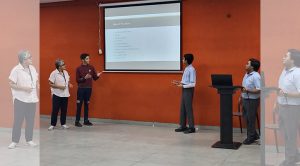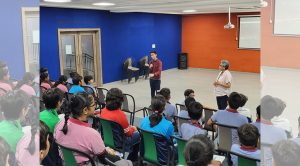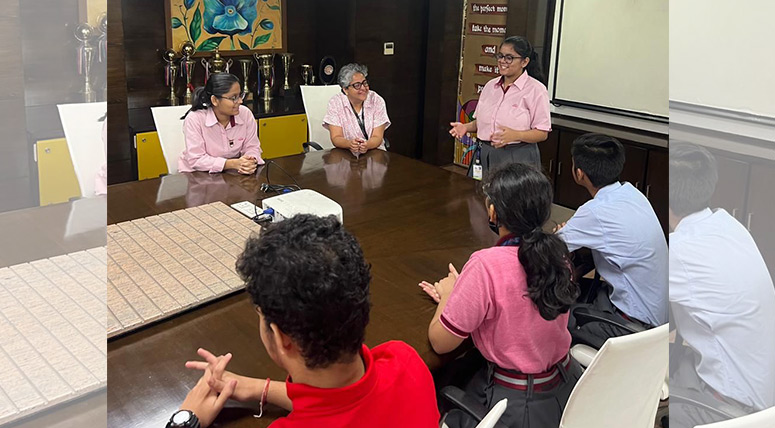Happy Diwali from Team MRIS VIBES and MRIS CHARMWOOD
Praying to Lord Ganesha, the God of intellect to bestow all with a Scintillating, Sparkling Personality!
KEYS TO PERSONALITY DEVELOPMENT
Have you ever imagined what the success mantra of an outstanding personality is? How clear communication helps to develop your personality?
Let us see what Ms. Surabhi Joshi of MRIS, Charmwood has to say on this-
According to her and as we all know, human life is not even possible without communication! Difficult to imagine? Isn’t it? But it is the truth.
She further elucidates, “Mankind has been communicating through paintings, sounds and gestures even before we could speak words, read or write. We are the only species that connect not just with sounds, but express ourselves through words, dialects and scripts too. We love to connect, contact, converse, announce, tell, reveal, assert, talk, interchange, notify, convince, persuade, deliver, transfer, elucidate, express and do much more with verbal, written as well as nonverbal communication.”
The most powerful tool that we as humans have, to make an impact and leave an impression on others, is our communication skills. It speaks for our personality. Effective communication is an art and an important life skill too. It comes in good stead at every step of our life. We communicate with family and friends, other people around us and our academic, professional as well as social success is defined by how effectively we can communicate and put across our thoughts and ideas to others.

Effective communication, personality development and confidence complement each other and go hand in hand.
A few days ago, I walked into a session being beautifully conducted by a few senior school students for their juniors. The seniors had approached me on their own, wanting to form a club for their juniors, to groom and train them for future events. What struck me the most in our first interaction and then later during the session, was their ability to confidently and clearly communicate their ideas to the juniors and make an impact. These seniors proved to be evolved students, taking and executing initiatives, with clarity and focus, which reflects in their confident stance and personality. This evolution however did not take place overnight. They have had their incubation period, with its own set of ups and downs, yet they continued to work upon a certain skill set and eventually have gained proficiency over it. This in turn has boosted their confidence and developed their personality. On the other side of the session, were students unknowingly depicting a desire to expand their capabilities, probably entering their incubation period, and thereby ready to widen their scope and horizon. In them, I could see future leaders in such student led sessions.
Each individual is on his or her own journey of developing this skill set and giving meaning to their life.
Some years ago I came across a student going on a rough trajectory in communication skills. Let’s name her Ruma. Ruma was a topper in her school. Her report card was impressive. However at the end of her first day at the best CBSE school of Faridabad, Manav Rachna International School, Charmwood, she went back home with disappointed drooping shoulders. By the end of the week, she lost her smile and by the end of the month had started hiding behind other students.
You see Ruma, otherwise a bright student, had come from a Hindi medium school with an entirely Hindi speaking background. The medium of instruction in the new school was obviously English. Ruma’s vocabulary in English was limited; her grammar incorrect, her comprehension of the language inadequate and consequently it all drastically affected her performance and brought her to the lowest possible grade. The only subjects where she continued to perform and score well in were Hindi and Sanskrit. She would go tongue tied when asked questions in class and of course forming and asking doubts was unimaginable to her. Her classmates would make fun of her incorrect usage of language. Her confidence was at the lowest, self-esteem shattered. Eventually Ruma went into a shell. This is when I intervened. Ruma’s problem was not her IQ, she was certainly not a dull learner. Her problem was the Mount Everest of effective communication in a language in which her understanding was limited. We worked closely together starting from the scratch. My target was not lifting her grades, but boosting her confidence and self-esteem which would in term boost her personality. CDs, books and journals of my daughter’s primary grades were pulled out, dusted and used. Gradually vocabulary and expression was added to her understanding and eventually Ruma picked up.
My interaction with Ruma was also an eye opening experience for me. I saw students in class in a new light. Most of the quiet ones in class or the ones hiding behind others- are not shy (you need to see them with their peer group outside the classroom set up), are not dull (in fact are quite expressive and knowledgeable when speaking in a language they are confident in). They are so because they lack effective communication skills and are not confident enough to express themselves in the official language!
Communication skill, like any other skill can be taught, acquired and put to one’s best advantage because after all communication is the only bridge that helps us connect with the world. The quality of becoming an effective communicator lies in each one of us. While in some, it has blossomed and bloomed, in others it still lies in the form of a seed. With proper nurturing and nourishment of attention and practice, the seed can be cultivated and effective communication skills reared.

How to nurture communication skills?
You will do it only when you are ready and want to do it!
Remember the movie /English Vinglish’? This was about the journey of the evolution of a middle aged, under confident, housewife who is looked down upon, yet overcomes her drawback to emerge confidently victorious. If she can do it, you can do it.
Tips to develop verbal and written communication
I strongly feel that the importance of LSRW (in that order) is often under-rated by us. Effective communication in any language can be developed by following the Language Ladder – Listening to the language, Speaking in the language, Reading in the language and Writing in the language.
Just as an infant picks up the mother tongue that it hears and starts verbally communicating in it before actually learning how to read and write it, any language can be learnt and mastered by following the LSRW.
- Early learners often automatically replicate appropriately dialogues from cartoons that they watch. If the language and verbal quality of the animations/videos that they are watching is monitored (listening), the quality of their expressions (speaking) will automatically be refined. Audio books too are a big help now in exposing one to the vocabulary, intonation, pronunciation and other nuances of the language.
- Watch videos that model conversational skills.
- Create opportunities where critical thinking and response (speaking) is fostered. Instead of asking, “Did you like it?” which would elicit just a yes/no response, reframe the question and ask open ended questions instead, “What did you like most about it?” or “ What would you do in a situation like this?”
- Team tasks also provide opportunities to actively communicate and work with peers in a non-threatening, non-judging environment.
- Constructive feed-back from others provides positive feed-forward. Recording of speaking videos also do the trick of helping one to recap, reflect and improve upon self. If video of peers doing the same task is also made available, one can always pick good points from peers. Something that I have tried and works well is having auditions with all participants present. They get to see and hear each other, rate themselves, vote for the best amongst all stating reasons and identify areas of self-improvement.
- Place orders on phones, use telemarketers to help develop communication skills. They are anonymous and will not judge you for your mistakes.
- Reading in the language helps build vocabulary and expression. Reading can be in any form/genre. If reading looks like a task, to begin with, read things of interest- sports, science, space, cars, football, entertainment, comics, stamps, hobbies, holidays…list is endless. Read bill boards, signs, manuals, blogs, captions everything that passes your eye.
- Varied reading not only enhances awareness on various topics, but also gives one content to converse and communicate with people of varied tastes
- Once L, S, R has been taken care of W becomes much easier. Start with personal writing anything that you want in diary, memoirs, journals (plethora of topics available on net). Once you build on it, public and official writing becomes smooth.
- Use the digital medium responsibly to communicate. Think creatively and write captions. Start and online conversation and share your opinions and ideas about things. Again to begin with it, you can try it out with a small community of friends that you are comfortable with. Support of friends will give you confidence to communicate more and with a wider audience which will further enhance your personality.
Tips to develop non-verbal communication
Communication is a two way street. We communicate, even when we don’t communicate! A lot can be ‘said’ even when not ‘said’. Don’t you wink and pass a message? Don’t you just nudge and communicate or clap and tell? Don’t you just look away and convey? Don’t you just hug and express or smile and impress or stare and distress?
Non-verbal cues to facial expressions, body postures, eye contact, play a significant part in effective communication. Pay close attention to the speaker or whoever you are physically communicating with. Listen patiently and attentively without interrupting. Any kind of fidgeting, looking here and there, checking phone, doing something else, is really disrespectful to the other and shows that you really are not a part of the conversation.
- Comfortable eye contact, a gentle nod, a warm smile shows that you are there as an interested party to the communication.
- Having an open body position, (no crossing of legs, arms) shows that you are open to conversation and listening.
Verbal and nonverbal interactions together make any communication effective. Armoured with communication competency, a strong and confident personality automatically evolves and emerges. As Brian Tracy says, “Communication is a skill that one can learn. It’s like riding a bicycle or typing. If you are willing to work at it, you can rapidly improve your personality and the quality of every part of your life.”
Author: Ms. Surabhi Joshi, Vice Principal, MRIS Charmwood






